Number 741 - James Brown
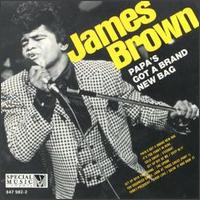
Number 741
James Brown
"Papa's Got A Brand New Bag"
(1965)
.
.
Genre:R&B/Soul
 You can only imagine what it would be like to be in a room with James Brown and Little Richard together. (Throw in Eddie Murphy and it would be pure pandemonium!) Now the real question is ... What was in Papa's brand new bag? Hmm?
You can only imagine what it would be like to be in a room with James Brown and Little Richard together. (Throw in Eddie Murphy and it would be pure pandemonium!) Now the real question is ... What was in Papa's brand new bag? Hmm? (AP) In life and in death, James Brown should be remembered for his impact on music and on the world, not for the many people that surrounded him, the Rev. Al Sharpton said Friday in a passionate eulogy befitting the godfather of soul."When he started singing, we were sitting in the back of the bus. When he stopped singing we were flying Lear jets," Sharpton told about 300 mourners during a private funeral service for Brown at Carpentersville Baptist Church.
May 3 1933 – December 25 2006
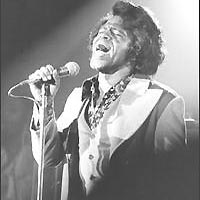 "Soul Brother Number One," "the Godfather of Soul," "the Hardest Working Man in Show Business," "Mr. Dynamite" -- those are mighty titles, but no one can question that James Brown has earned them more than any other performer. Other singers were more popular, others were equally skilled, but few other African-American musicians have been so influential on the course of popular music. And no other musician, pop or otherwise, put on a more exciting, exhilarating stage show; Brown's performances were marvels of athletic stamina and split-second timing.
"Soul Brother Number One," "the Godfather of Soul," "the Hardest Working Man in Show Business," "Mr. Dynamite" -- those are mighty titles, but no one can question that James Brown has earned them more than any other performer. Other singers were more popular, others were equally skilled, but few other African-American musicians have been so influential on the course of popular music. And no other musician, pop or otherwise, put on a more exciting, exhilarating stage show; Brown's performances were marvels of athletic stamina and split-second timing. 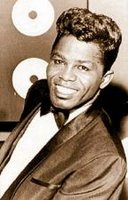 Through the gospel-impassioned fury of his vocals and the complex polyrhythms of his beats, Brown was a crucial midwife in not just one, but two revolutions in American black music. He was one of the figures most responsible for turning R&B into soul; he was, most would agree, the figure most responsible for turning soul music into the funk of the late '60s and early '70s. Since the mid-'70s, he's done little more than tread water artistically; his financial and drug problems eventually got him a controversial prison sentence. Yet in a sense his music is now more influential than ever, as his voice and rhythms were sampled on innumerable rap and hip-hop recordings, and critics have belatedly hailed his innovations as among the most important in all of rock or soul.
Through the gospel-impassioned fury of his vocals and the complex polyrhythms of his beats, Brown was a crucial midwife in not just one, but two revolutions in American black music. He was one of the figures most responsible for turning R&B into soul; he was, most would agree, the figure most responsible for turning soul music into the funk of the late '60s and early '70s. Since the mid-'70s, he's done little more than tread water artistically; his financial and drug problems eventually got him a controversial prison sentence. Yet in a sense his music is now more influential than ever, as his voice and rhythms were sampled on innumerable rap and hip-hop recordings, and critics have belatedly hailed his innovations as among the most important in all of rock or soul. 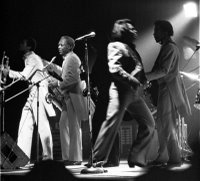 Brown's rags-to-riches-to-rags story has heroic and tragic dimensions of mythic resonance. Born into poverty in the South, he ran afoul of the law by the late '40s on an armed robbery conviction. With the help of singer Bobby Byrd's family, Brown gained parole, and started a gospel group with Byrd, changing their focus to R&B as the rock revolution gained steam. The Flames, as the Georgian group were known in the mid-'50s, were signed by Federal/King, and had a huge R&B hit right off the bat with the wrenching, churchy ballad "Please, Please, Please." By now the Flames had become James Brown & the Famous Flames, the charisma, energy, and talent of Brown making him the natural star attraction.
Brown's rags-to-riches-to-rags story has heroic and tragic dimensions of mythic resonance. Born into poverty in the South, he ran afoul of the law by the late '40s on an armed robbery conviction. With the help of singer Bobby Byrd's family, Brown gained parole, and started a gospel group with Byrd, changing their focus to R&B as the rock revolution gained steam. The Flames, as the Georgian group were known in the mid-'50s, were signed by Federal/King, and had a huge R&B hit right off the bat with the wrenching, churchy ballad "Please, Please, Please." By now the Flames had become James Brown & the Famous Flames, the charisma, energy, and talent of Brown making him the natural star attraction. 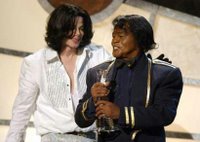 Brown's new era had truly begun, however, with "Out of Sight," which topped the R&B charts and made the pop Top 40. For some time, Brown had been moving toward more elemental lyrics which threw in as many chants and screams as words, and more intricate beats and horn charts that took some of their cues from the ensemble work of jazz outfits. "Out of Sight" wasn't called funk when it came out, but it had most of the essential ingredients. These were amplified and perfected on 1965's "Papa's Got a Brand New Bag," a monster that finally broke Brown to the white audience, reaching the Top Ten. The even more adventurous follow-up, "I Got You (I Feel Good)," did even better, making number three.
Brown's new era had truly begun, however, with "Out of Sight," which topped the R&B charts and made the pop Top 40. For some time, Brown had been moving toward more elemental lyrics which threw in as many chants and screams as words, and more intricate beats and horn charts that took some of their cues from the ensemble work of jazz outfits. "Out of Sight" wasn't called funk when it came out, but it had most of the essential ingredients. These were amplified and perfected on 1965's "Papa's Got a Brand New Bag," a monster that finally broke Brown to the white audience, reaching the Top Ten. The even more adventurous follow-up, "I Got You (I Feel Good)," did even better, making number three.  Brown was both a brilliant bandleader and a stern taskmaster, leading his band to walk out on him in late 1969. Amazingly, he turned the crisis to his advantage by recruiting a young Cincinnati outfit called the Pacemakers, featuring guitarist Catfish Collins and bassist Bootsy Collins. Although they only stayed with him for about a year, they were crucial to Brown's evolution into even harder funk, emphasizing the rhythm and the bottom even more. The Collins brothers, for their part, put their apprenticeship to good use, helping define '70s funk as members of the Parliament/Funkadelic axis.
Brown was both a brilliant bandleader and a stern taskmaster, leading his band to walk out on him in late 1969. Amazingly, he turned the crisis to his advantage by recruiting a young Cincinnati outfit called the Pacemakers, featuring guitarist Catfish Collins and bassist Bootsy Collins. Although they only stayed with him for about a year, they were crucial to Brown's evolution into even harder funk, emphasizing the rhythm and the bottom even more. The Collins brothers, for their part, put their apprenticeship to good use, helping define '70s funk as members of the Parliament/Funkadelic axis.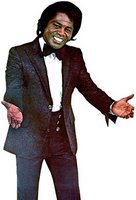 It's probably safe to assume that Brown will not make any more important recordings, although he continues to perform and release new material like 1998's I'm Back. Yet his music is probably more popular in the American mainstream today than it has been since the 1970s, and not just among young rappers and samplers. For a long time his cumbersome, byzantine discography was mostly out of print, with pieces available only on skimpy greatest-hits collections. A series of exceptionally well-packaged reissues on PolyGram has changed the situation; the Star Time box set is the best overview, with other superb compilations devoted to specific phases of his lengthy career, from '50s R&B to '70s funk. ~ [Richie Unterberger]
It's probably safe to assume that Brown will not make any more important recordings, although he continues to perform and release new material like 1998's I'm Back. Yet his music is probably more popular in the American mainstream today than it has been since the 1970s, and not just among young rappers and samplers. For a long time his cumbersome, byzantine discography was mostly out of print, with pieces available only on skimpy greatest-hits collections. A series of exceptionally well-packaged reissues on PolyGram has changed the situation; the Star Time box set is the best overview, with other superb compilations devoted to specific phases of his lengthy career, from '50s R&B to '70s funk. ~ [Richie Unterberger]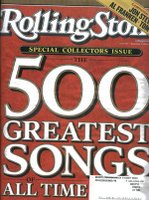 What does Rolling Stone Magazine think about James Brown ?
What does Rolling Stone Magazine think about James Brown ?(About Papa's Got A Brand New Bag) : And, all of a sudden, there was funk: 126 seconds of clipped, spare, unfiltered blammo; a nine-piece horn section whose only job is to smack you in the face every few seconds; and a brand-new beat. It was rammed onto tape in under an hour en route to yet another show. ~ [Source:Rolling Stone]
 Crowbarreds choice for Website to find more on James Brown ... Click on the address http://www.playlouder.com/news/~james-brown-laid/
Crowbarreds choice for Website to find more on James Brown ... Click on the address http://www.playlouder.com/news/~james-brown-laid/Rolling Stone Top 500 Songs ranked this song at Number 72 and the album ranked at (Only had one good song on it)
This song has a crowbarred rating of 66.5 out of 108
This song has a crowbarred rating of 66.5 out of 108
Tags: James Brown, Little Richard, Soul, 1965, The Flames, Funkadelic, Music, Youtube, Music Video, Rolling Stone Magazine, Video, The Definitive 1000 Songs of all Time
Search by Genre: ALT POP-ALT PUNK-ALT ROCK-ALTERNATIVE-BIZARRE-BLUES-BRIT POP-COMEDY-COUNTRY-CROONER-DANCE-DISCO-DO WOP-ELECTRONIA-FOLK SINGER-FOLK ROCK-FUNK-GARAGE ROCK-GLAM ROCK-GOSPEL-GRUNGE-GUITARIST-HAIR ROCK-HARD ROCK-HIP HOP-INDIE POP-INDIE ROCK-INDUSTRIAL ROCK- INSTRUMENTAL-JAZZ-LAZY SUNDAY-NEW WAVE-NU ROCK-POP-POP ROCK-PROG ROCK-PSYCHEDELIC ROCK-PUNK POP-PUNK ROCK-R&B-RAP-REGGAE-ROCK-ROCK N ROLL-SINGER SONGWRITER-SKA ROCK-SKIFFLE-SOFT ROCK-SOUL-SOUTHERN ROCK-SURF ROCK-SYNTH POP-TENOR-VOCAL
By The Year 1955 to 2005:
1955, 1956, 1957, 1958, 1959, 1960, 1961, 1962, 1963, 1964, 1965, 1966, 1967, 1968, 1969, 1970, 1971, 1972, 1973, 1974, 1975, 1976, 1977, 1978, 1979, 1980, 1981, 1982, 1983, 1984, 1985, 1986, 1987, 1988, 1989, 1990, 1991, 1992, 1993, 1994, 1995, 1996, 1997, 1998, 1999, 2000, 2001, 2002, 2003, 2004, 2005

underlay trademe
Labels: James Brown

















0 Comments:
Post a Comment
<< Home